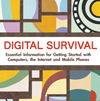Error message
- Warning: file_get_contents(http://survival.tacticaltech.org/sites/survival.tacticaltech.org/themes/survival/templates/splash.php): failed to open stream: HTTP request failed! HTTP/1.1 404 Not Found in include() (line 88 of /srv/d7/sites/survival.tacticaltech.org/themes/survival/templates/page.tpl.php).
- Notice: Undefined variable: hide_site_name in include() (line 100 of /srv/d7/sites/survival.tacticaltech.org/themes/survival/templates/page.tpl.php).
- Notice: Undefined variable: hide_site_name in include() (line 104 of /srv/d7/sites/survival.tacticaltech.org/themes/survival/templates/page.tpl.php).
- Notice: Undefined variable: hide_site_slogan in include() (line 117 of /srv/d7/sites/survival.tacticaltech.org/themes/survival/templates/page.tpl.php).

This work is licensed under a Creative Commons Attribution-Share Alike 3.0 Unported License.

 If you use a computer, the sad fact is that you need to know about computer viruses. There are many different ways to classify viruses, each with its own set of colourfully named categories. Worms, macroviruses, trojans and backdoors are some of the more well-known examples. Many of these viruses spread over the internet using email, malicious webpages or other means to infect unprotected computers.
If you use a computer, the sad fact is that you need to know about computer viruses. There are many different ways to classify viruses, each with its own set of colourfully named categories. Worms, macroviruses, trojans and backdoors are some of the more well-known examples. Many of these viruses spread over the internet using email, malicious webpages or other means to infect unprotected computers. Any connection in to your computer can be a source of vulnerability: your office or home network, the internet, a USB flash drive or even someone who has just walked into your office.
Any connection in to your computer can be a source of vulnerability: your office or home network, the internet, a USB flash drive or even someone who has just walked into your office.